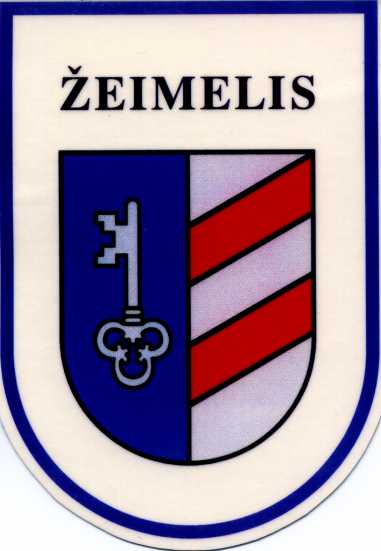 |
 |
The description below is from a copy of a Lithuanian document, given to Barry Mann by the Mayor of Zeimelis, Algirdas Budnikas in 1999.
(Still to be edited.)
|
Vilnius December 19,1996 |
EMBLEM OF ZEIMELIS TOWN
| Historical data:
Zeimelis was first mentioned in historical sources from the 13th century. From the beginning of the 16th century to 1732 the Zeimelis manor was owned by subjects of the Livonian Order. In 1587, after the adjustment of the Lithuanian border with Curonia, Zeimelis became a part of Lithuania. In 1540 K. Tyzenhauz (a Lithuanian nobleman) built the first Lutheran Evangelist Church. In the court records of the Upyte district of 1586, 1595, Zeimelis is called a small town. In 1613 Sigismund Vasa (the Grand Duke of Lithuania) granted Zeimelis a privilege to hold two fairs a year. When the border settled, the town found itself at the very border, of the road connecting Kaunas – Upyte – Riga. At the beginning of the 17th century, there were warehouses and a department of the Kaunas Customs Office. Zeimelis did not lose its importance as a trade transit post even after the third division of the United Polish-Lithuanian Commonwealth (in 1795). The production of surrounding manors reached Bauske, Mintauja, Riga. Zeimelis was the last settlement on the way to Curonia, that is why pubs prospered there. In 1828 St. Peter and Paul’s Church was built. In the period between World War I and World War II there were border posts in Geruciai and Ruoniai, which were situated close to Zeimelis on the Lithuanian and Latvian border. Since Zeimelis had no coat of arms, professor Albertas Gurskas, taking into account the history of the town and its geographical location, suggested using the symbols of the border, i.e. stripes on the border pole, and a key that means closing and opening. In religious art, a key symbolizes the right of judgment that was given to the apostle Peter, the patron of the Zeimelis Church. In the tradition of the Middle Ages the presentation of the town keys relates to legal actions that grant authority. The design of the coat of arts of Zeimelis, made by artist Albertas Gurskas, was approved by the Heraldry Commission of Lithuania on December 5, 1996 (the minutes No 164). Description of the coat of arms:
Executive secretary of
(signature)
|
Copyright © 2000, Barry Mann